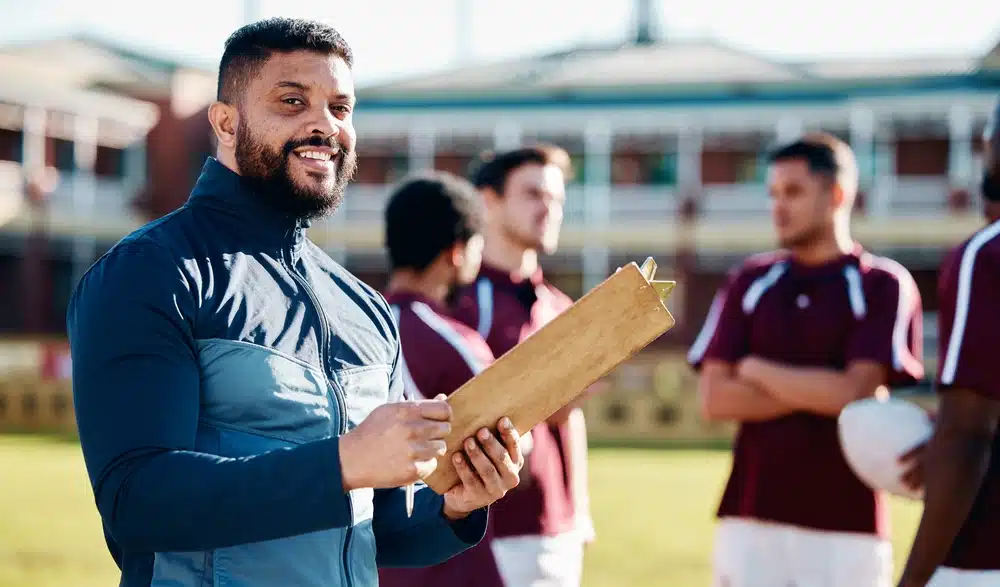Sports Scholarships
Securing a sports scholarship can be a dream come true for many aspiring athletes. A scholarship not only helps lower the cost of education but also provides an opportunity to combine education with sports. Explore sports scholarships: basics, the role of academics, athletic importance, the application process, and myths debunked.
Understanding the Basics of Sports Scholarships
Before you proceed on your journey to secure a sports scholarship, it’s crucial to understand the basics. A sports scholarship is financial aid provided to a student-athlete by a college or university. It’s designed to alleviate some or all of the costs of a college education in exchange for the student’s commitment to participate in their chosen sport for the college’s team.
When it comes to sports scholarships, there is more than meets the eye. It’s not just about receiving financial assistance; it’s about the opportunity to represent your college or university in athletic competitions. Sports scholarships provide student-athletes with a platform to showcase their skills and talents while also pursuing their academic goals.
What is a Sports Scholarship?
A sports scholarship is an agreement between a student and a college or university. The student agrees to participate in a specific sport and represent the school in competitions, while the school agrees to cover part or all of the student’s tuition fees. Although scholarships vary in their terms, all require the student to maintain a certain level of academic performance and adhere to strict rules of conduct.
Being a recipient of a sports scholarship is not just about playing a sport; it’s about being a student-athlete. It requires a balancing act between academics and athletics. Student-athletes must manage their time effectively to excel both on the field and in the classroom. They must demonstrate discipline, dedication, and a strong work ethic to succeed in both areas.
The Different Types of Sports Scholarships
The types of sports scholarships at disposal can be broadly categorized into full-ride and partial scholarships. Full-ride scholarships, as the name suggests, cover all college expenses, including tuition, boarding, books, and sometimes even living expenses. Partial scholarships, on the other hand, only cover a portion of these costs. Both types of scholarships are highly competitive and require a significant commitment from the student, both academically and athletically.
Full-ride scholarships are often considered the ultimate goal for student-athletes. They provide an opportunity to pursue higher education without the burden of financial constraints. With a full-ride scholarship, student-athletes can focus on their sport and academics without the added stress of worrying about tuition fees or other expenses. These scholarships are highly sought-after and are usually awarded to exceptional athletes who have demonstrated outstanding skills and potential.
Partial scholarships, while not covering the entire cost of education, still provide valuable financial assistance. They can help offset a significant portion of the expenses, making college more affordable for student-athletes. Partial scholarships are often awarded to athletes who have shown promise and dedication in their sport but may not meet the criteria for a full-ride scholarship. These scholarships still require a strong commitment from the student-athlete, as they must maintain their athletic performance and academic standing to continue receiving the scholarship.
Regardless of the type of sports scholarship, it’s important for student-athletes to understand that it’s not just about the financial benefits. Scholarships provide an opportunity to grow as an individual, develop leadership skills, and build a strong network within the sports community. They offer a chance to compete at a higher level and gain exposure to potential professional opportunities in the future.
The Importance of Academic Performance in Sports Scholarships
While athletic abilities are critical to securing a sports scholarship, academic performance is equally important. In fact, colleges and universities usually require student-athletes to maintain a certain grade point average (GPA) in order to keep their scholarships.
Academic performance plays a significant role in sports scholarships as it reflects a student athlete’s commitment to their education. It demonstrates their ability to excel not only on the field but also in the classroom. Colleges and universities understand the importance of providing a well-rounded education to their student-athletes, and thus, they emphasize the need for academic excellence.
Balancing Sports and Academics
Balancing sports and academics can be a challenging task for many student-athletes. It’s important to develop good time management and study habits, as maintaining a solid GPA is crucial for scholarship retention. While sports might dominate your schedule, remember that a sports scholarship is also about your education. Therefore, never compromise on your academics.
Student-athletes often find themselves juggling between practices, games, and schoolwork. They have to manage their time efficiently to ensure they have enough hours in the day to excel in both areas. This requires discipline, dedication, and effective planning. Student-athletes may need to sacrifice social activities or leisure time to prioritize their studies. However, the rewards of a sports scholarship and a quality education make the effort worthwhile.
Minimum Grade Requirements for Scholarships
Most colleges and universities have set minimum grade requirements for students to be eligible for sports scholarships. Despite slight variations, the NCAA requires a student to have a minimum GPA of 2.3 in high school core courses for Division I athletes and 2.2 for Division II athletes. Always consult with your scholarship provider to understand specific grade requirements.
These minimum grade requirements serve as a benchmark to ensure that student-athletes are achieving academic success while participating in sports. They encourage student-athletes to prioritize their studies and maintain a certain level of academic performance. By setting these standards, colleges and universities aim to produce well-rounded individuals who can excel both athletically and academically.
Meeting the minimum grade requirements not only allows student-athletes to retain their sports scholarships but also opens doors to various opportunities. It demonstrates their commitment to their education and showcases their ability to balance the demands of sports and academics. Additionally, maintaining good academic standing can lead to other academic accolades, such as being named to the Dean’s List or receiving academic honors.
It is important for student-athletes to understand that academic performance is not just a requirement for scholarships but also a valuable asset for their future. The skills and knowledge gained through education can complement their athletic abilities and provide them with a solid foundation for success in their chosen careers.
The Role of Athletic Ability in Securing Scholarships
Sports scholarships are primarily awarded to athletes who demonstrate exceptional ability in a certain sport. Therefore, your athletic performance is a crucial factor in determining whether or not you get a scholarship.
However, it’s important to note that athletic ability alone is not the sole determinant of securing a sports scholarship. While it plays a significant role, there are other factors that come into play, such as academic performance, character, and potential for growth.
When it comes to athletic ability, different sports require different skills. For instance, speed and agility are paramount in football, whereas accuracy and coordination are crucial in basketball. Coaches often look for athletes who excel in specific key skills required for their sport. Thus, honing these skills can significantly increase your chances of securing a sports scholarship.
Key Skills for Different Sports
Let’s take a closer look at some key skills required for various sports:
- Football: In addition to speed and agility, football also requires strength, endurance, and tactical awareness. Being able to read the game, make quick decisions, and work effectively as part of a team are highly valued skills in this sport.
- Basketball: Apart from accuracy and coordination, basketball players need to possess good dribbling skills, shooting accuracy, and the ability to anticipate the movements of their opponents. Height and jumping ability can also be advantageous in this sport.
- Tennis: Tennis players must have excellent hand-eye coordination, footwork, and the ability to generate power in their shots. Mental toughness, strategic thinking, and the ability to adapt to different playing styles are also essential in this individual sport.
These are just a few examples, but it’s important to research and understand the specific skills required for the sport you are interested in pursuing.
Improving Your Athletic Performance
Now that we’ve discussed the importance of athletic ability and key skills, let’s explore some ways to improve your overall athletic performance:
- Training Regimen: Start by setting up a strict training regimen that includes a combination of strength training, cardiovascular exercises, and sport-specific drills. Consistency is key, so make sure to stick to your training schedule.
- Nutrition: Fueling your body with the right nutrients is essential for optimal athletic performance. Maintain a balanced diet that includes a variety of fruits, vegetables, lean proteins, and whole grains. Stay hydrated and avoid excessive intake of sugary or processed foods.
- Rest and Recovery: Adequate rest is crucial for your body’s recovery and rebuilding. Make sure to incorporate rest days into your training schedule and prioritize getting enough sleep each night. Additionally, consider incorporating stretching, foam rolling, and massage therapy to aid in muscle recovery.
- Seek Professional Guidance: Consider hiring a personal coach or trainer to provide guidance tailored to your strengths and weaknesses. They can help you develop a personalized training plan, provide technical feedback, and offer support and motivation throughout your athletic journey.
Remember, improving your athletic abilities takes time, dedication, and perseverance. Stay focused, work hard, and never underestimate the power of a strong work ethic. You can increase your chances of securing a sports scholarship with the right combination of talent, skills, and determination.
The Application Process for Sports Scholarships
The application process for sports scholarships can be quite complex. It involves a number of steps and a considerable amount of time to prepare. However, with the right guidance and preparation, you can increase your chances of securing a scholarship that will not only support your athletic endeavors but also provide you with valuable educational opportunities.
When embarking on the application process, it is crucial to start by researching and collecting information about the specific scholarship you intend to apply for. This includes understanding the eligibility criteria, the application deadline, and any additional requirements that may be needed. By familiarizing yourself with these details, you can tailor your application to meet the specific expectations of the scholarship committee.
Once you have gathered all the necessary information, the next step is to gather all the necessary documents. These typically include high school transcripts, letters of recommendation, athletic statistics, and a personal statement. It is important to allocate sufficient time to gather these documents and ensure that they are complete and accurate. Incomplete or inaccurate documentation can negatively impact your application.
When preparing your personal statement, take the opportunity to showcase your passion for your sport and your dedication to both athletics and academics. Highlight any significant achievements, challenges you have overcome, and lessons you have learned along the way. A well-crafted personal statement can provide the scholarship committee with valuable insights into your character and potential.
Before submitting your application, it is essential to review it thoroughly. Check for any grammatical or spelling errors, and ensure that all the required documents are included. Taking the time to review your application can demonstrate your attention to detail and commitment to excellence.
Tips for a Successful Interview
If you are shortlisted and called for an interview, congratulations! This is an opportunity for you to impress the scholarship committee further and showcase your skills and abilities in person. To make the most of your interview, it is important to prepare thoroughly.
First and foremost, make sure to research the scholarship program and the organization offering it. Familiarize yourself with their mission, values, and any recent achievements or initiatives. This knowledge will demonstrate your genuine interest and commitment to the scholarship.
During the interview, be prepared to discuss your sport in detail. Showcase your deep knowledge and passion for your chosen discipline. Talk about the hours of practice, the sacrifices you have made, and the lessons you have learned through your athletic journey. Provide specific examples of your accomplishments and persistence in overcoming challenges, both in sports and academics.
It is also important to emphasize your commitment to academics. Highlight any academic achievements, extracurricular activities, or leadership roles you have taken on. The scholarship committee wants to see that you are not only dedicated to your sport but also to your education.
Remember to dress professionally and maintain good eye contact throughout the interview. Be confident but also humble. Show gratitude for the opportunity to be considered for the scholarship and express your sincere desire to make a positive impact in your chosen field.
By following these tips and putting in the necessary effort, you can increase your chances of success in the application process for sports scholarships. Remember, it is not just about the scholarship itself but also about the valuable experiences and opportunities it can provide for your future.
Common Misconceptions About Sports Scholarships
Like with many things, there are some misconceptions surrounding sports scholarships that can potentially deter aspiring athletes from pursuing them. It’s necessary to debunk these stereotypes and understand reality to make a well-informed decision.
Debunking Myths About Sports Scholarships
One common myth is that sports scholarships are only offered for high-profile sports like football or basketball. The truth is that many schools offer scholarships for a variety of sports, including swimming, golf, and even fencing. Another common myth is that all sports scholarships cover the entire cost of college. However, as we discussed earlier, there are many partial scholarships that cover only a fraction of the total cost.
Understanding the Realities of Sports Scholarships
The realities of securing a sports scholarship are that it’s a highly competitive process requiring an immense amount of work, dedication, and passion. Although it comes with challenges, achieving a sports scholarship is a rewarding accomplishment that opens up opportunities to pursue a stellar athletic career while also obtaining a quality education.
In conclusion, securing a sports scholarship requires an in-depth understanding of the process as well as diligent preparation. Always remember to prioritize your academics, polish your athletic skills, and be well-informed before embarking on this journey.









































